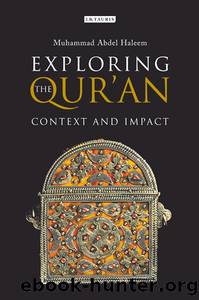Exploring the Qur'an by Exploring the Qur'an. Context & Impact (2017)

Author:Exploring the Qur'an. Context & Impact (2017) [Retail]
Language: eng
Format: epub
ISBN: 9781786721655
Publisher: Bloomsbury UK
Published: 2017-03-29T00:00:00+00:00
Conclusion
Warning of the Resurrection was a fundamental function of the Prophet. Resurrection and Judgement are the pinnacle of the Islamic belief in the One God who creates, sends scriptures and will call people to account in the end. Without the Resurrection, the creation of people would be in vain (âabath) and contrary to the attributes of God as al-malik al-ḥaqq (âthe true Kingâ, Q. 23:115â16) and aḥkam al-ḥÄkimÄ«n (âthe fairest of judgesâ, Q. 95:8), who would not treat in the same way those who believe and do righteous deeds and those who corrupt the earth (Q. 38:28 and Q. 68:35â6). For this reason, the Resurrection and Judgement are referred to directly or indirectly in every page of the Qurâan.
Most of the Arabs first addressed by the Qurâan could not accept the Resurrection and fiercely argued against it. As stated earlier, their arguments were based on the decay of the human body, which they thought could not be brought together and revived again. This was their sole argument for the Resurrection being âajÄ«b (âstrangeâ). The Prophet who warned about it was seen as either a poet or a madman or someone who invented lies about God. Against this the Qurâan marshalled the numerous arguments we have seen in SÅ«rat YÄ SÄ«n, which give strong refutations of the disbelieversâ own arguments. The Qurâan notes the disbelievers accepted that it was God who created the heavens and earth and who created them in the first place. With this in mind, it argues that recreating the human being is an easy task for the one who created what is greater and more complex than a human being. Indeed, God is capable of creating things from their opposite. This shows the Meccan disbelieversâ logic to be weak and inconsistent. Had they not believed in Godâs creation, they would have been harder to convince. It is true that they asked the Prophet to prove the Resurrection on the spot by bringing back some of their ancestors:
They say, âThere is only our life in this world: we die, we live, nothing but time destroys us.â They have no knowledge of this; they only follow guesswork. Their only argument, when Our clear revelations are recited to them, is to say, âBring back our forefathers if what you say is true.â
Q. 45:25
From the Prophetâs point of view the answer was easy; it was not he who could do this but God, who created them: â[Prophet,] say, âIt is God who gives you life, then causes you to die, and then He gathers you all to the Day of Resurrection of which there is no doubt, though most people do not comprehendââ (Q. 45:25â6). The Resurrection comes only at the appointed time (al-ajal al-musammÄ), known only to God.
The disbelievers, in spite of all their obduracy, were aware that they were not in a very strong position. The Qurâan produces arguments for the Resurrection from two areas: first, what people can see and feel around them in the realm of plants,
Download
This site does not store any files on its server. We only index and link to content provided by other sites. Please contact the content providers to delete copyright contents if any and email us, we'll remove relevant links or contents immediately.
| Hadith | History |
| Law | Mecca |
| Muhammed | Quran |
| Rituals & Practice | Shi'ism |
| Sufism | Sunnism |
| Theology | Women in Islam |
The History of Jihad: From Muhammad to ISIS by Spencer Robert(2619)
Nine Parts of Desire by Geraldine Brooks(2359)
The Turkish Psychedelic Explosion by Daniel Spicer(2353)
The First Muslim The Story of Muhammad by Lesley Hazleton(2267)
The Essential Rumi by Coleman Barks(2043)
1453 by Roger Crowley(2022)
The Last Mughal by William Dalrymple(1855)
Trickster Travels: A Sixteenth-Century Muslim Between Worlds by Davis Natalie Zemon(1847)
Muhammad: His Life Based on the Earliest Sources by Martin Lings(1644)
God by Aslan Reza(1639)
by Christianity & Islam(1627)
A Concise History of Sunnis and Shi'is by John McHugo(1567)
No God But God by Reza Aslan(1539)
Magic and Divination in Early Islam by Emilie Savage-Smith;(1533)
The Flight of the Intellectuals by Berman Paul(1501)
Nothing to Envy by Barbara Demick(1445)
Art of Betrayal by Gordon Corera(1429)
What the Qur'an Meant by Garry Wills(1391)
Getting Jesus Right: How Muslims Get Jesus and Islam Wrong by James A Beverley & Craig A Evans(1340)
